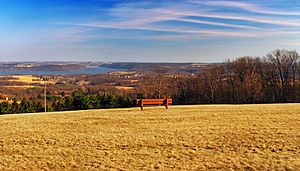Mount Pisgah (York County, Pennsylvania) facts for kids
Quick facts for kids Mt. Pisgah |
|
|---|---|
| Highest point | |
| Elevation | 865 ft (264 m) |
| Prominence | 500 ft (150 m) |
| Geography | |
| Location | York County, Pennsylvania, U.S. |
| Parent range | Piedmont (United States) |
| Topo map | USGS Red Lion (PA) 7.5-minute Quadrangle |
Mount Pisgah is a mountain peak in York County, Pennsylvania. It's located southwest of a town called Wrightsville. This mountain is a great spot to enjoy nature and learn about the land around it.
Where is Mount Pisgah?
Mount Pisgah stands 865 feet tall. It looks over the Susquehanna River in southern Pennsylvania. The mountain rises about 500 feet above the nearby countryside. This gives visitors amazing views of the lower Susquehanna Valley.
You can find Samuel S. Lewis State Park right on Mount Pisgah. On clear days, you might even see Governor Dick Hill. That's about 18 miles away!
What Does the Name "Pisgah" Mean?
Mount Pisgah gets its name from a famous mountain in the Bible. This biblical mountain is in Jordan. It's where Moses first saw the promised land.
How Was Mount Pisgah Formed?
Mount Pisgah is a great place to learn about geology. Geology is the study of Earth's rocks and how they change. The land near Mount Pisgah has very old rocks. These rocks are called metamorphic rocks. They are between 600 and 450 million years old.
These metamorphic rocks were once sedimentary rocks. Sedimentary rocks form from layers of sand, mud, and other materials. Over time, these layers turned into rocks like sandstone and shale. They formed in shallow ocean areas.
About 450 million years ago, a huge event happened. Mountains were being built! This caused high pressure and heat. It changed the sedimentary rocks into new types. These new rocks include slate and schists.
Over millions of years, the land kept changing. It was pushed up and folded. Then, wind and water wore it down. This process created the landscape we see today. Mount Pisgah itself is made of a very strong rock. It's called quartzite. This rock is part of the Chickies Formation.


